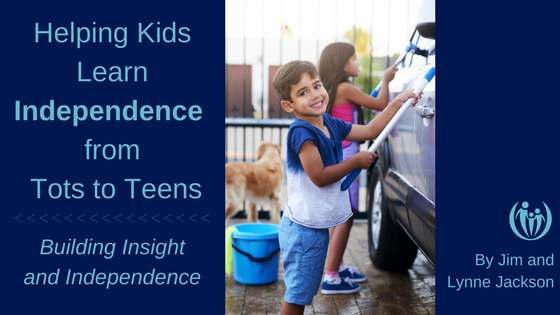
Helping Kids Learn Independence from Tots to Teens
Our teen-aged son had been working on a variety of “extra-credit” home projects for us as a way to earn money. (For younger parents, don’t miss Tips for Tots application below.) I definitely noticed some strengths and weaknesses in his work habits. I was tempted to give him the rundown of my assessment, and pay him what I thought his work was worth, and move on, no questions asked. Then I remembered my renewed commitment to be more thoughtful and intentional in my parenting.
So I said, “Looks like you’ve gotten most of today’s list done. I want you to evaluate how it went. What do you think are the characteristics of a diligent worker? Like, what would an employer be looking for in someone who does a really good job?”
He answered, “Someone who takes initiative, and doesn’t get distracted,” and then continued, “And doing careful, high quality work.”
“Those are good ones,” I commented, and then added, “And probably doing thorough clean-up after a job is done.”
Again resisting the temptation to give him my assessment, I asked, “So, on a scale of 0 (the worst possible job) to 10 (the best possible job) how do you think you did?” He rated himself similarly to how I’d have rated him on each of the characteristics, averaging about a 5. I gave him the “salary range” I was considering and told him I would pay him what he honestly thought he deserved based on the quality of his work. He chose an amount slightly below what I was thinking. I paid him accordingly.
A few days later I gave him another list of jobs. On this one he recorded work times for each job much more accurately. He told me he worked pretty hard and only got distracted once to check emails. He rated his work a 6 or 7 and assessed that he had earned a wage of $1 higher than for his first list. He definitely seemed prouder of his “job performance” on this second try, and again I paid him accordingly.
Asking children self-assessment questions like these helps them learn to think for themselves about the work they’re doing. As they think for themselves (instead of us just telling them the “right” answers) they become more self-responsible in the following ways:
- Stronger values and motivation (i.e. “What does it take to be a diligent worker? How would you rate yourself at each of those things?”)
- Increased discrimination/insight (i.e. “Which letter in the row is really your best one?” or “Which homework task is the best starting place for you?”)
- Healthy resistance to peer pressure or wrong judgments by others (i.e. “What do you think is important in a friendship? In what ways are the friendships you’ve chosen like those things, and in what ways are they different?”)
Tips for Tots:
Research has shown that teaching children to assess the quality of their work increases school performance, for kids even as young as pre-school. It’s normal to say, “Wow, great picture. I love the horsey in this corner.” The child smiles, feeling good, but having thought none about her effort. Instead, parents can ask questions to help their child evaluate their work, “Wow, I see you worked really hard at this! Which part did you work the hardest on? Which part do you like the best?” You can even follow up a play date with questions such as, “What did you play that was really fun? What did you do that made it fun for your friend?” You can give your child choices of ideas if he/she can’t answer. This process engages a child in thinking about what she did in a way that can foster character growth.
Apply It Now:
Whether the issue for your child is learning the alphabet, the skills of a diligent worker, how to have good friendships or any of a variety of skills and values, here’s a self-assessment question for you as a parent – On a 0 to 10 scale, how effective are you at helping your child grow in self-awareness, insight, and independence? What might you do to increase that one or two points?
To learn more, register for our online course The Entitlement Fix: Growing Hard Work and Gratitude In Your Kids!
This fast-paced 4-session course is designed to give parents a solid strategy for stamping out entitled attitudes, and moving toward greater meaning in life.
You’ll learn to take your kids through a simple process for helping your family have constructive conversations about rights, responsibilities, and privileges in your home. You’ll learn graceful responses for the inevitable conflict that emerges when parents confront selfishness. Most importantly, you’ll learn a perspective that grounds all your efforts in eternal truths from the Bible.
Join us today! At $23, we believe this is a fantastic value. If this is still out of your reach, simply contact us for a scholarship.


